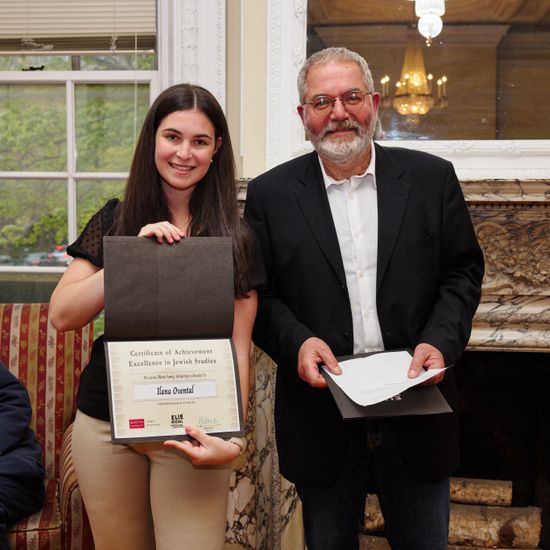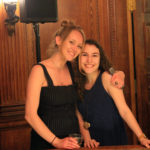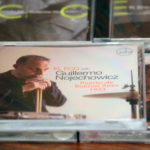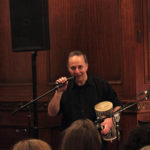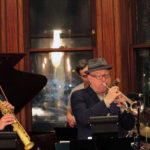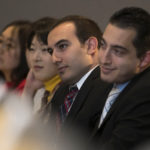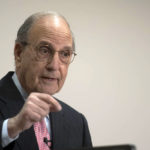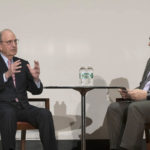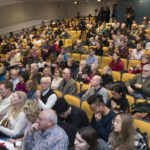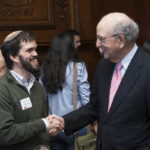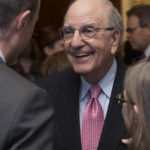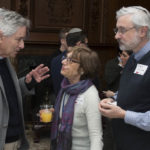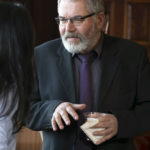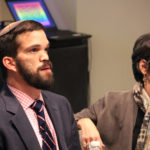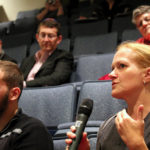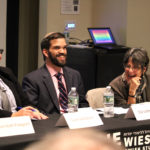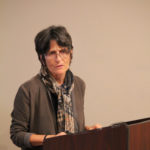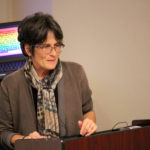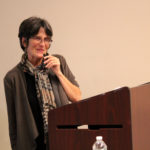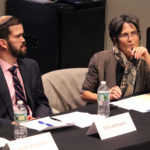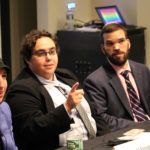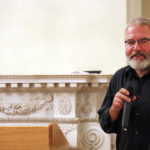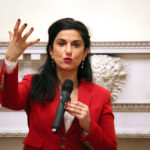To celebrate another fantastic year, the Elie Wiesel Center for Jewish Studies held its End-of-Year Celebration on Wednesday, May 4th. The festivities honored our students who minored in Jewish Studies, Hebrew, and Holocaust, Genocide, and Human Rights Studies by presenting them with awards for scholarships and prizes. In addition to honoring this year’s talented and high-performing graduates in the minor programs, the evening included a gathering in honor of Professor Michael Zank, who will be concluding his more than a decade appointment as Director of the Center at the end of June. Professor Nancy Harrowitz, who will be Zank’s successor, thanked him for his years of distinguished and skillful leadership. The event was well attended by students, faculty, and staff members who enjoyed mocktails prepared by our undergraduate student worker, Mikky Steinberg. On Thursday, April 7, 2022, the Elie Wiesel Center for Jewish Studies welcomed Steve Greenberg, a record producer, two-time Grammy Award winner, and Founder/CEO of S-Curve Music, who discussed the history of Israeli popular music. In his talk, Greenberg shared excerpts of popular songs throughout Israel’s history and examined how Israel’s music has reflected and affected Israeli society’s evolution. To learn more about Steve Greenberg and his work, you could visit S-Curve Record’s website or listen to his music history podcast Speed of Sound, produced by iHeartMedia. If you missed Greenberg’s talk, you could now watch the live stream recording on our Youtube channel or the linked video below. This event was held virtually on Zoom and in-person at the Elie Wiesel Center’s library and was co-sponsored by the Consulate General of Israel to New England. On Thursday, March 31, 2022, Dr. David Lehrer, the Israel Institute Postdoctoral Teaching Fellow at the Elie Wiesel Center, moderated the Arava Institute Alumni Panel titled “Nature Knows No Borders: Israelis and Palestinians Living and Working Together to Protect the Environment” in person at the Elie Wiesel Center, where he was joined virtually on Zoom by two Arava Institute Alumni Odeliya Matter and Mohammad Azraq, who shared stories of how the Israeli-Palestinian conflict has personally affected them and how their perspective shifted and empathy for ‘the other’ grew. In their conversation with Dr. Lehrer, both Odeliya and Mohammad shared what they learned about cooperation around mutual goals while studying at the Arava Institute, including the importance of open, respectful, and transformative dialogue. The Arava Institute for Environmental Studies brings Jewish, Arab, and international students together to study the region’s environment and build trust. Students also participate in the Institute’s internationally acclaimed Peace-building Leadership Seminar, which teaches them consensus-building skills, models of conflict transformation, and how to listen to and engage with other narratives thoughtfully. The Dialogue Project held this year at the Elie Wiesel Center for Jewish Studies aims to bring this message of peace to college campuses and communities in the U.S. and provides, in the process, college students with a rare insight into the Middle East and the Israeli-Palestinian conflict. To learn more about the Institute’s work, you can visit The Arava Institute for Environmental Studies’ website or contact the CEO of Friends of the Arava Institute, Miriam May, at miriam@friendsofarava.org. You can also watch the recording of the entire conversation in the video linked below or by visiting our Youtube channel. The Abraham Accords between Israel, the UAE, and Bahrain opened the door to a new era of cooperation and friendship. Sharaka, which means ‘partnership,’ was founded by young leaders from Israel and the Gulf to turn the vision of people-to-people peace into a reality. On March 29, 2022, the Elie Wiesel Center for Jewish Studies was pleased to host members of the Sharaka Delegation from the United Arab Emirates, Bahrain, Morocco, and Israel at Boston University to discuss “The New Middle East.” During this event, members of the Delegation, Dan Feferman, Chama Mechtaly, Fatema Al Harbi, and Yahya Mahamid, shared information about the work Sharaka does, how they got involved, and the importance of the historic Abraham Accords agreement in advancing peace and stability in the region. This event was organized in partnership with BU Students for Israel, Hillel, and the Consulate General of Israel to New England.You can watch the recording of the entire conversation with members of the Sharaka Delegation in the video linked below or by visiting our Youtube channel. The Boston University Jewish Studies Research Forum (BUJS Forum) aims to facilitate advanced research in Jewish studies or Holocaust, Genocide, and Human Rights Studies. This spring, the Elie Wiesel Center for Jewish Studies was honored to host Dr. Lilach Lachman on February 24, 2022, and Dr. Gilah Kletenik on March 24, 2022, for our two BUJS Forums of the semester held both virtually on Zoom and in-person at the Center’s library. In her lecture titled “Voice, Audience, and Gender in the Israeli Lullaby: Notes Towards an Alternative History,” Dr. Lachman, an Israel Institute fellow and visiting scholar at the Elie Wiesel Center of Jewish Studies, discussed her research project that began with the anthology of lullabies titled Yavo Gdi Zahav (“A golden lamb shall come”) published in 2015. Dr. Lachman explored in this talk how the modern Hebrew lullaby—after centuries of silence—evolved as a subversive translingual strain of minor literature; a hybrid genre that turned away from both Zionist folk songs and the purisms of Israeli modernism. For our second BUJS Forum of the semester, Dr. Gilah Kletenik, a Postdoctoral Associate at the Elie Wiesel Center for Jewish Studies, spoke about Spinoza and the “denaturalization of sovereignty,” the subject of her current book project Sovereignty Disrupted: Spinoza and the Disparity of Reality. In her talk, titled “Serves No Purpose: Spinoza’s Denaturalization of Sovereignty,” Dr. Kletenik revisited Spinoza’s acclaimed critique of anthropocentrism and teleology by considering it within the context of his broader ontology, which affirms reality as infinite and therefore also immanent. You can watch the live stream recording of Dr. Kletenik’s talk in the video linked below or directly on our Youtube channel. The Elie Wiesel Center for Jewish Studies co-sponsored the Town Hall on Russia’s Invasion of Ukraine at Boston University School of Law. Nearly 200 Boston University students were in attendance on March 17, 2022, as ten faculty members from various departments across Boston University examined the different aspects of the war, speaking from their area of expertise before opening the floor for discussion to the audience. You can learn more about the Town Hall in the article published by BU Today. To mark International Holocaust Remembrance Day, the Elie Wiesel Center for Jewish Studies hosted on January 30, 2022, a virtual panel discussion on Zoom with Professor Deeana Klepper, Associate Professor of Religion and History at the Elie Wiesel Center, and Rabbi Noam Marans, AJC Director of Interreligious and Intergroup Relations who explored how ideas emanated from the early Christian church led to modern manifestations of antisemitism. This online panel was moderated by Rob Leikind, Director of AJC New England, with welcome remarks by Professor Michael Zank, Director of the Elie Wiesel Center for Jewish Studies, and Ambassador Meron Reuben, Consul General of Israel to New England. This event was organized by the Elie Wiesel Center for Jewish Studies in partnership with AJC New England and the Consulate General of Israel to New England to commemorate International Holocaust Remembrance Day. You can watch the live stream recording of the panel discussion in the video linked below or directly on our Youtube channel. On January 26, 2022, the Elie Wiesel Center for Jewish Studies hosted an online event that discussed the popular new Turkish Netflix show The Club. In a discussion moderated by Dr. Sultan Doughan, a former Post-Doctoral Fellow at the Elie Wiesel Center, Dr. Esra Özdemir, Visiting Lecturer in Language Studies at Brown University, discussed the role of language and the approach to gender in the popular new Turkish Netflix show The Club with Professor Pelin Başçı, Professor of Humanities at Portland State University, and Dr. Roberta Micallef, Professor of the Practice in World Languages and Literatures and Women Gender and Sexuality Studies at Boston University. Read the following articles to learn more about this much-watched Netflix series woven around the story of an Istanbulite Jewish woman named Matilda: You can also watch the live stream recording of the event in the video linked below or directly on our Youtube channel.2021 – 2022 Events
End-of-Year Celebration and Award Ceremony
May 4th, 2022
The History of Israeli Music with Steven Greenberg
April 7, 2022
The Dialogue Project: A Better Peacebuilding Paradigm
March 31, 2022
Sharaka Organization Delegation at BU: Israeli, Emiratis, Bahrainis, and Moroccans Discuss the New Middle East
March 29, 2022
Boston University Jewish Studies Research Forum (BUJS)
February 24, 2022
March 24, 2022
Town Hall on the War in Ukraine Co-Sponsored by The Elie Wiesel Center for Jewish Studies
March 17, 2022
International Holocaust Remembrance Day Event – Tracing the Roots of Modern Antisemitism: Can Learning about Our Past Explain Our Present?
January 30, 2022
Power, Hierarchy, and Community in 1950s Istanbul: a Response to Netflix’s “The Club”
January 26, 2022
2019 – 2020 Events
The 2019 Rabin Memorial Lecture was delivered by Peter Beinart, a renowned contributing editor for The Atlantic and senior columnist at The Forward. A distinguished panel responded to Beinart’s lecture, moderated by Professor Lori Lefkovitz, Director of Jewish Studies and the Humanities Center at Northeastern University. On the panel were Rachel Fish, formerly associate director of the Schusterman Center for Israel Studies at Brandeis University, Eve Spangler, Associate Professor of Sociology at Boston College, and Dov Waxman, Professor of Political Science, International Affairs, and Israel Studies at Northeastern University. Read more… Watch the full video of the lecture and panel: The tradition of boy dancers in Iran goes back to the Achaemenid Empire and continued until the middle of the 20th century. The speaker, Dr. Houman Sarshar, Director of Publications at the Center for Iranian Jewish Oral History, explored the role of these boy dancers in Iranian culture and what led to their disappearance. The lecture considered the complex history of male sexuality and gender in Iran, and it touched on the history of art, especially late nineteenth-century portrait photography. This event was organized by Elie Wiesel Center for Jewish Studies faculty member Abigail Gillman, Associate Professor of Hebrew, German & Comparative Literature, and Professor Sassan Tabatabai, Senior Lecturer in Persian and Core Head of Persian Language Program, both members of the World Languages and Literatures department of BU College of Arts and Sciences. Read more. The Elie Wiesel Center hosted Israeli theater and television star and playwright Dror Keren in residency in March 2019 in preparation for two WORLD PREMIERE performances of his new play, “What Life Wants” at Boston Playwright’s Theatre at Boston University. The staged readings were directed by Israeli Stage‘s Guy Ben-Aharon. The play enters the labyrinth of the family unit in this middle-aged drama of what might have been. On the last day of the matriarch’s shiva, a sudden phone call from the estranged father to his eldest son, Dudi, stirs the pot of his already-frayed emotions. Confronted with the destabilizing convergence of his mother’s death, the emotional complexities of his grieving twin-sisters, challenges with his own perhaps-failing marriage, his only daughter’s impending departure for Canada, and now, his father’s unexpected and perplexing re-appearance, Dudi does what any middle-aged man in this situation would do – obsesses mercilessly about the distance between, what should have been, what remains, and what to do now. An examination of film using the Holocaust as its central topic. What are the political and cultural effects when genocide is represented through film? On Wednesday, January 27, The Elie Wiesel Center welcomed Ambassador Andrew Young, Yavilah McCoy, and Dr. Susannah Heschel for a public conversation on black-jewish identity, relations, and the realities of racism in the US today. The discussion was moderated by Fresh Air contributor Sonari Glinton (CAS ’96). Special thank you to Dave Green for these beautiful images capturing the evening. Watch a full video of the conversation: This Research Forum featured the research of Elie Wiesel Center for Jewish Studies Visiting Scholar Sultan Doughan. Dr. Doughan just completed her PhD in anthropology at UC Berkeley where she was a student of the late Sabba Mahmood. She was joined by respondent Jeremy Menchik, Assistant Professor of International Relations at the Frederick S. Pardee School of Global Studies. Dr. Doughan discussed her work with Berlin educational institutions that use the Holocaust to educate migrants of Muslim backgrounds in German humanistic and civic values. At the core of this talk was the experience of an educational “trip for humanity” to Auschwitz. The presentation illustrated how tolerance educators in Berlin convey the meaning of “humanity” through personal engagement with the Holocaust. Dr. Doughan described the tension between the operative conception of humanity and notions of citizenship and race, complicating the notion of a common humanity in contemporary German ways of conceptualizing Jewish and Muslim identities. In honor of International Holocaust Remembrance Day, Elie Wiesel Center co-sponsored a screening of “Who Will Write Our History?” directed by Roberta Grossman. This film tells the story of Jewish resistance within Auschwitz. The Oyneg Shabes archive reveals a collective of journalists and scholars who fought back against the Nazi regime within the camps. In commemoration of Yom HaShoah, hundreds of venues screened this film to remember their courage and sacrifice. Co-Sponsored by AJC New England, the Jewish Cultural Endowment and the Elie Wiesel Center for Jewish Studies at Boston University, with promotional support from Boston Jewish Film. When we devoted the inaugural Elie Wiesel Memorial Lecture Series to the commemoration of the eightieth anniversary of “Kristallnacht,” we wanted to conclude with lessons from the past for today. Mark Hetfield offered reflections on the lessons we might learn from the past for the most massive crisis of refugees the world has seen since the end of the Second World War. Hetfield is the President and CEO of HIAS, a refugee aid group established in 1881 whose mission is to rescue people whose lives are in danger for being who they are. German Consul General to the New England States, Nicole Menzenbach, was the respondent. The speakers were introduced by Elie Wiesel Center for Jewish Studies faculty member Deeana Klepper, Professor of History and Religion in the College of Arts and Sciences. View the full gallery of photographs from the evening. Watch a video of the full lecture: Omer Bartov, John P. Birkelund Distinguished Professor of European History at Brown University, delivered a lecture on what happened “After Kristallnacht,” in World War II, when violence became routinized. Prof. Bartov, a native of Israel, recently completed a study of the genocidal violence that wiped out the Ukrainian Jewish community of Buczacz, his mother’s hometown. In this meticulously researched book, Bartov calmly shows that genocidal violence is not necessarily caused by military invasion but may come about as the result of long-simmering ethnic resentment and micro-conflicts that are allowed to coalesce into collective acts of score-settling. His point is that it can happen anywhere. Following the lecture at the Photonics Building, students and community members gathered for an intimate conversation with Prof. Bartov at the Elie Wiesel Center for Jewish Studies. Ute Frevert, Director of the Max Planck Institute for Human Development, explored first in this talk the emotional politics of the first state-orchestrated pogrom in Nazi Germany, and, second, the emotions it raised among Jewish and non-Jewish Germans. She went on to investigate the memory culture that emerged after 1945, and concluded by putting Elie Wiesel’s 1989 warning to the test: has the memory of 1938 faded after the German reunification? And what kind of emotions (and emotional politics) have been involved in the process?2018 – 2019 Events
Yitzhak Rabin Memorial Lecture
US Jews and Israel: Are we headed for divorce?
April 11, 2019
The Leon and Alice F. Newton Family Lecture in Jewish Studies
Houman M. Sarshar on “The Jewish Boy Dancers of Iran”
April 2, 2019

“What Life Wants” Performance of a new work by Dror Keren
March 30, 2019
Holocaust Through Film Series
February 25 — April 29, 2019
Can feature films portray history, and if so, what are the consequences for an informed society? A series of screenings for the BU community and two public screenings. The series was organized by Elie Wiesel Center for Jewish Studies faculty member Professor Nancy Harrowitz for a new Jewish Studies course offered for Spring 2019 semester entitled “The Holocaust Through Film” (CAS CI 387, XL387, COM CI387).Black/s and Jew/s Then and Now
February 27, 2019
BUJS Research Forum: Auschwitz as a “Teachable Moment”? The Holocaust in German Civic Education in Multicultural Context
January 30, 2019

Film Screening: “Who Will Write Our History?”
January 27, 2019

Elie Wiesel Memorial Lecture Series:
Commemorating the 80th Anniversary of Krisallnacht
November 9, 1938: Emotions and Emotional Politics: Then and Now, and In-Between, lecture by Mark Hetfield
November 12, 2018
Elie Wiesel Memorial Lecture Series:
Commemorating the 80th Anniversary of Kristallnacht
After Kristallnacht: The Routinization of German State Violence in the East, lecture by Omer Bartov
October 29, 2018

Elie Wiesel Memorial Lecture Series: Commemorating the 80th Anniversary of Kristallnacht
“November 9, 1938: Emotions and Emotional Politics Then and Now, and In-between” with Ute Frevert

At 7pm in the EWCJS Boardroom, Room 201, students, friends and family gathered to celebrate the end of the semester and to honor the achievements of students in Jewish Studies and in Holocaust and Genocide Studies. Professor Zank opened the event with a musical performance accompanied by EWCJS employees and graduating seniors Blake Dickler (QSB ’18) and Sophie Collender (COM ’18). Following the performance Professor Zank distributed merit awards in to a number of students: The awards ceremony also honored students for excellence in their study of Hebrew, presented by Professors Abigail Gillman and Mira Angrist. Matan Zamir, a representative from the Israeli Consolate, witnessed the ceremony and congratulated all the students on their achievements. The ceremony concluded with a performance of Bashanah Hab’ah by Professor Zank, Blake and Sophie. You can watch that performance here. EL ECO took the stage following the awards ceremony, performing two different musical sets at 8pm and then at 9:40 pm. The Elie Wiesel Center library was packed with friends and fans of jazz, and the acoustics made it possible to hear the music clearly throughout the building. Our final film screening of the year brought Executive Producer Jonathan Bernstein to BU to discuss both The Chosen and In Her Own Time. In Her Own Time was screened in CAS 326 the following Tuesday, making this a two part film series exploring Orthodox Jewish life in both fiction and in documentary film. In Her Own Time is a documentary following the work of anthropologist Dr. Barbara Myerhoff in Los Angeles, specifically her fieldwork in the Fairfax community of Orthodox Jews in the 1980s. She did this work while also battling a cancer diagnosis, and the documentary focuses as much on her life as it does on her subjects of study. She received acclaim for her work on communities that were personal to her while overlooked by other anthropologists; she chaired the anthropology department at the University of Southern California and founded the Center for Visual Anthropology. Myerhoff and the director of In Her Own Time Lynne Littman also won an Academy Award for their documentary short Number Our Days, about the elderly Jewish community of Venice, CA. In Her Own Time recounts her life and work, and shows Myerhoff in a personal light as she finds support from the Fairfax community during this difficult time in her personal life. Littman took over the production of In Her Own Time when Myerhoff succumbed to her illness in 1985, and the documentary came out a year later. Jonathan Bernstein was on hand to discuss he work on the production of this film as well as The Chosen and the Woody Allen film Everything You Always Wanted to Know About Sex But were Afraid to Ask (1972). Hosted in CGS 527, English Professor Susan Bernstein screened the film The Chosen adapted from Chaim Potom’s award-winning novel about two Jewish boys forming an unlikely friendship as they come of age in 1940s Brooklyn. Directed by Jeremy Kagan, the film follows the conflicts and friendship between Reuven, the son of a liberal Jewish professor, and Danny, the son of a Hasidic Rebbe. In spite of their differing backgrounds Danny and Reuven form a close bond, as Reuven supports Danny’s thirst for knowledge and teaches him about the world outside of the Orthodox community of Brooklyn. As Reuven’s father becomes involved in the foundation of Israel following World War II, Danny and Reuven’s relationship becomes more strained as the Hasidic and Modern Orthodox Jewish communities drift further apart. The boys eventually part ways after college as Reuven sides more with his father. Reuven then is excommunicated from the Hasidic community, and it isn’t until Israel’s establishment that Reuven and Danny reconcile their friendship before parting ways. Danny also makes peace with his father, and Danny ends the film with a more modern approach to becoming a rabbi himself. Professor Bernstein invited the audience to the In Her Own Time screening the following Tuesday, where producer Jonathan Bernstein would answer questions and discuss The Chosenas well as In Her Own Time. Long before directing Casablanca, Austrian director Michael Curtis (known as Mihaly Kertesz prior to working under an Anglicized name), directed a silent Biblical epic directly in competition with Cecil B DeMille’s original The Ten Commandments. His film, Moon of Israel, premiered in 1923 and tells a story of forbidden love between an Israeli slave and an Egyptian prince around the time of the Exodus. Moon is one of the few films of that era to survive in full, thanks to the restoration work of Austrian pianist and accompanist Gerhard Gruber. Gruber joined the Elie Wiesel Center in Kilachand Hall’s event space for a screening of Moon of Israel, where he provided a live score alongside the film. His score, unlike other film scores, is performed entirely improvised. The audience that evening was treated to a version of the film screening that was unlike any other. Gruber stayed after the film to answer questions and provide some context to the film, pointing out the elaborate costume and sets as well as the performances of the actors. Gruber is one of the few musicians who performs live accompaniment for silent films, and it was a fascinating and special event for all who attended. Professor of Religion at USC Jessica Marglin presented her research on the “informal imperialism” of the 19th century at Spring 2018’s only Modern Mediterranean Identities series event. In her research, Marglin specifically focuses on how Europeans living in the Islamic Mediterranean (North Africa and the Middle East regions) shaped the political climate of the area. Extraterritoriality refers to Westerners having privileges, including exemptions from the law, within the Ottoman Empire. She argues that as a result, the common narrative of history focuses entirely on the goals of Western imperialism and the separation between Muslims and non-Muslims within in the Mediterranean. Marglin complicates this linear, “the West imposed extraterritorial practices on others” framework by referring to modernization as “simultaneous but uneven forces unfolding.” She uses specific examples of legal practices at the time to make it clear how nationality and religious identity have become inseparable. It is not as simple as “secular Europeans brought modernity to the religious Middle East.” Marglin argues that nationality in the 19thcentury was much more about the rights of expats living abroad than those living in their “naturalized” country. The result then was that a given person could have a layered citizenship status that totally differed from their neighbor’s. For instance, free black Americans prior to the Civil War or French subalterns weren’t full citizens in their home countries, but abroad they had the protections of American or French nationals, respectively. Differences religion, race, and social class played a role in how they were treated, and Marglin explains that the “protected nationals” of Western imperialism lived on a spectrum of belonging or not belonging to their home country. Another example of this nuanced understanding of nationality that Marglin cites is Russia protecting Orthodox Christians living within the Ottoman Empire during the 19th century, and the beginnings of Christian independence movements in places like the Balkans which Europe supported. She concludes that “nationality” as scholars understand it today coalesced as the world moved into the 20th century, and that it is important for those who study nationalism to remember the impact of extraterritoriality. Her model offers Mediterranean history a “more connective” and less linear idea of the progress into modernity. Harvard professor of Jewish Studies Derek Penslar offered a response to Marglin’s work, connecting his own study of nationalism (specifically political Zionism) to this framework of how 19th century people thought about national belonging. The Elie Wiesel Center invited former Senate majority leader and foreign policy advisor George J. Mitchell to BU Law Auditorium on March 14 to be the featured speaker of the 2018 Yitzhak Rabin Memorial Lecture, an ongoing lecture series supported by Mr. Jonathan Krivine (CAS ’72). The lecture began with an opening reception at the Elie Wiesel Center, with faculty, students and guests present to welcome and mingle with Senator Mitchell prior to his lecture. The lecture itself was presented in the Law Auditorium, and began with opening remarks and an introduction by Elie Wiesel Center Director Michael Zank and the College of Arts and Sciences Dean Ann Cudd. Senator Mitchell began his discussion with an anecdote about humility, telling the story of the book he promoted about the Irish “Good Friday” Peace Agreement of 1998, and of the Irish American woman who thought he was Henry Kissinger and asked him to sign a Kissinger poster anyway. He transitioned into speaking about the namesake of the lecture series, Yitzhak Rabin, and his role as a peacemaker as Israeli Prime Minister. Mitchell hosted Rabin several times during Mitchell’s years in the Senate, and he discussed his fond memories of him as well as the impact of Rabin’s assassination following the Oslo Accords on the course of the Israeli-Palestinian conflict. His remarks moved toward a larger discussion about conflict, and the long-standing fear of the end of stability. Fear about the future and the next generations, he said, traces back even to the foundations of democracy in Greece circa 500 BCE. The period of relative global stability following the Second World War, he argued, is coming to an end. He quoted Pope Francis in recognizing the ways religion plays a part in conflicts that are mainly about the wealth and power of certain groups or nations. Mitchell began discussing the history of the Middle East and the impact of imperialism and religious tension within the region, especially between Sunni and Shiite Muslims. Their religious leaders have, he argued, inflamed the conflict further to the detriment of the people who live there. He spoke about the desire for the people of those countries to have a safe and secure life, whether in the Middle East or as immigrants taking refuge in another part of the world. He urged that Israel and Palestine pursue a beneficial two-state solution to improve the lives of the people there as well as the overall stability in the region. Following Mitchell’s lecture, he sat down for a discussion and Q&A session hosted by Adil Najam, Dean of the Pardee School for Global Studies, lasting well into the evening. Audience members, several of them students, asked Senator Mitchell about his advice for the current administration, and the differences between how the conflict in Northern Ireland was resolved and how the U.S. may approach the conflicts in the Middle East. You can watch the full lecture and discussion here: http://www.bu.edu/buniverse/view/?v=1w0hjM0 Artist and Guggenheim Memorial Fellow Cynthia Madansky joined us in CAS 326 in order to screen her essay film “ḤARĀM.” A unique addition to the Spring 2018 Film Series, “ḤARĀM” deals with opposing positions on the future of the Temple Mount. The Temple Mount Faithful group plans to rebuild the Third Temple at the Haram Al Sharif, meeting resistance from Muslim worshippers. Unlike many documentaries, Madansky’s film presents no talking heads and resists taking a political side in the discussion. Rather, the opposing viewpoints are presented with alternating speakers, one from each position, over footage of the Noble Sanctuary itself as well as the markets and homes that surround the area. Other than these voices the film has no sound other than the whirring of film as it records the residents, and IDF officers who pass through the area. Because the film doesn’t appear to take a specific position on the Temple Mount Faithful movement, the discussion following the screening aimed at putting the film in a larger political and artistic context. The film was shot on a 16mm camera, so the audience also discussed Madansky’s use of an older technology to make a cinema verité-style documentary, and how she uses film and celluloid in her filmmaking. In the first screening of the Spring semester, Hebrew Professor Mira Angrist presented the documentary “In Search of Israeli Cuisine” in the Director’s Office of the Elie Wiesel Center to a full audience, including her class of Hebrew students. Directed by Roger Sherman, and now streaming on Netflix, the film follows chef Michael Solomonov as he travels through Israel and documents a growing Israeli food scene that combines cuisine from a variety of traditions and serves the needs of all kinds of Israelis – Druze, Muslims, Christians, Orthodox Jews, and more. The film features not only the restaurants in Jerusalem and Tel Aviv but also meets the home cooks, specialty craftsmen (including cheesemakers and wine sommeliers), and street food vendors that feed the people of Israel. The screening was catered with Israeli food for lunch courtesy of Bonapita, as part of the event’s co-sponsorship with the BU Gastronomy Program. The first and only BUJS Forum event of the Spring 2018 semester hosted Harvard Professor Derek Penslar in the EWCJS library, recorded by WBUR and presented to a full audience. Professor Penslar presented his paper on Affect Theory, how emotions impact the social sciences specifically within international relations, and how this new research lens can impact the narratives of history and current political science. The paper is part of an upcoming book on Zionism as an emotional state, focusing on Zionist leaders like Theodore Hertzel and Chaim Weizmann. Penslar outlined his particular angle of study, one that has not often been considered in the study of history and political science, to begin his presentation. He argues that while nationalism can be considered an ideology, it is an ideology that uses logical means to justify emotional responses. He applied this research to the specific “emotional diplomacy” of both leaders. Hertzel approached anti-Semitism as an ideology that could be reasoned with, while Weitzmann instead had a more skillful approach to appealing to the emotions of anti-Semites. Emotions are deeply personal, and so to understand emotional diplomacy Penslar discussed the personal lives of both Hertzel and Weizmann in order to understand why both men turned to Zionism. According to Hertzel’s diaries he felt a deep sense of personal shame, which, Penslar argues, pushed him toward finding his own pride within the Zionist movement. Hertzel’s strategy of non-assimilation won over some anti-Semites, as it achieved their goals of Jews leaving to form a nation state. Anti-Semitism was an ideology that could be appealed to logically in Hertzel’s vision. Chaim Weizmann approached the political goals Zionism very differently. His international reputation and skill with emotional diplomacy lead to the passage of the Balfour Declaration, securing British support for the establishment of a Jewish state within Palestine rather than in Uganda as was proposed. Weitzmann called this declaration the “Jewish Magna Carta,” directly comparing Zionism to British settlement. He understood nationalism as bound up in emotions and historical narrative, and Penslar argues that those emotions directly influenced a rising anti-Semitic narrative of Jewish supremacy. Penslar discussed the rise of anti-Semitic conspiracy in the 1920’s, specifically focusing on how anti-Semites posited that Judaism promoted “Bolshevism” and therefore was an enemy to capitalism. Weizmann’s appeal to the emotions of Jewish people to encourage nationalism had the consequence of empowering anti-Semites in Europe and in the United States. Simon Rabinovitch offered a response to Penslar’s paper, complimenting his understanding of the “matrix of emotions” at play in diplomacy and in ideology. The audience also had an opportunity to ask questions about Penslar’s research. On the afternoon of December 4, 2017, Professor Jonathan Klawans (BU Department of Religion) spoke at the fall semester’s BUJS Research Forum. Elie Wiesel Center Director Michael Zank introduced Professor Klawans to a large and engaged audience of scholars and students. Klawans presented his sabbatical research on Mordecai Kaplan and Jewish antiquity with his talk “Judaism was a Civilization: Towards a Reconstruction of Ancient Jewish Peoplehood.” Klawans spoke not just on how we think about Jewish antiquity, but also the particular frames that scholars use to shape that thinking. By using the work of Mordecai Kaplan, who wrote about American Jewish identity as well as Jews of the Second Temple period in the 19th century, Klawans argues that we should embrace anachronism. The terms we use to study ancient people did not exist when those ancient people were alive, he argues, and that defining Judaism as solely a “religion” in a Protestant sense (absent from race or ethnicity) ignores the nuance in how Jews have identified themselves. Kaplan encouraged the use of the term “peoplehood” in order to understand Jewish identity as a “social heritage.” Klawans argues that this utilitarian term allows us to study Jewish history with a flexible way of categorizing. This terminology opens up the usefulness of primary sources when looking at early periods of Jewish life, and the context of folk art and traditions that have been associated with certain groups of Jews. The study of Jewish peoplehood releases the baggage, Klawans claims, of terms like “nation” or “religion.” The event concluded with a Q&A session about Klawans’ research and how he plans to expand these definitions in his upcoming book. The Modern Mediterranean Identities series reconvened on November 17, 2017 in the EWCJS library, this time focusing on “Catholic Pasts and Futures in France.” Professor Zank welcomed the audience over lunch, and thanked Professor Kimberly Arkin for her continued work to make the series possible. Professor Arkin introduced Professor Elayne Oliphant, Assistant Professor of Anthropology at NYU, and her respondent Cornell Professor of History Camille Robcis. She also thanked the audience as well as the staff of the Elie Wiesel Center for continuing to host and support this series. Professor Oliphant began her presentation by explaining the framework of her research, arguing that permeable ideas about what makes a space “public” allows for nuance in how the French understand Catholic ideas. She challenges the idea that France has moved past the Catholic Church as a guiding social force, and claims that the idea that the culture is “vanishing” highlights how Catholicism is in fact still privileged in France. Catholicism has become part of, as she puts it, “French architecture” as it has become a part of the “ambiance” despite the widely held conception that French society encourages laïcité (secularism). In the 19th century, churches were designed and built with support from the state, and they have become part of an imagined past of the people of France and what they have believed. Catholicism in France maintains a historical image of being crucial to French life, which Oliphant argues makes it an unmarked, privileged category despite being a religion. Camille Robcis responded to Oliphant’s paper by complimenting her focus on the “unacknowledged privilege” of Catholicism rather than statistical numbers. Robcis questions the use of the word “infrastructure” to describe Catholicism as ambient rather than “norm” or “ideology”. She also highlights Oliphant’s point about marriage as a social structure, and she argues that marriage became a social and legal agreement (and therefore more secular) to ensure that the state could survive. Both scholars discussed how French society negotiates the Catholic influences on marriage with currently changing norms around gay marriage and national identity. Catholic traditions in public life, they argue, impact the people of France regardless of race, class or religious affiliation. The event concluded with further discussion about this blend of secularism and religious tradition in political and social life. The Elie Wiesel Center screened journalist Nir Baram’s documentary The Land Beyond the Mountains, based on his book A Land Without Borders, to a packed audience of students and faculty in CAS 226 on Monday, October 30. The film follows Baram as he travels throughout the West Bank, meeting people with a variety of opinions about how to resolve the Israeli-Palestinian conflict. He interviews a member of Hamas, Israeli homeowners, Israeli and Palestinian political activists, and even Baram’s own father, a left wing politician. Through these conversations, Baram attempts to get to the truth of what life is like in this contentious stretch of land, which encompasses both beautiful neighborhoods and slum-like housing conditions that coexist along the border wall. While at the beginning of the film Baram seemed to believe in the possibility of a peaceful two-state solution, by the end of the film he questioned whether the conflict could be really be resolved by these means. The Palestinians he spoke with want to draw attention to their displacement in 1948, while Israelis on the whole want to negotiate around the borders designated in 1963. Baram argues that this difference in conversation, and miscommunications between the Palestinian activists and the Israeli government, makes the conflict more difficult to solve. He ends the film highlighting the grassroots work of groups like Two States One Homeland; it is the people of the West Bank organizing and speaking together that will, in his opinion, bring the conflict to an end. Baram answered audience questions following the screening, discussing how he adapted his written work into the medium of film and how his viewpoint altered over the course of making the film. He also talked about a few of his subjects, including the Hamas member with whom he keeps in touch, and of his optimism that the conversation can be shifted in a way that promotes justice. This was the first EWCJS event to be streamed live on Facebook. You can watch the livestream of Rabbi Anisfeld’s keynote speech here and the full panel here. On October 26, 2017, the Elie Wiesel Center for Jewish Studies hosted the fourth Leo Trepp Lecture at Boston University. The Leo Trepp Lecture Series honors Rabbi Leo Trepp (1913-2010), a revered German-American rabbi and philosopher who was exiled from Germany after brief internment during Kristallnacht. He became a much-beloved advocate of Jewish dialogue and engagement as a rabbi, first in Boston and then in Tacoma, Washington and Berkeley, California. His many publications include History of the Jewish Experience and The Complete Book of Jewish Observance. Rabbi Sharon Cohen Anisfeld set the tone for the following discussion. She started with the analogy that rabbis are “doorways” to Jewish life; therefore, it is imperative for rabbis to realize that how they respond to people seeking connection to Jewish life can either open or close that door. She suggested that rabbis should emphasize authentic, human encounters in their day-to-day relationships in order to foster Jewish life in their communities. She continued by saying that she believes that rabbinic work in 21st century North American context also means retrieving a rich, emotionally resonant Jewish “language” that has been lost. The shared vocabulary, literature, and rituals that link Jewish communities to one another and the past has been diminished in the North American Jewish experience. This “cultural repair” can only occur, she argued, if rabbis have an answer to the question: “Why be Jewish?” Wrestling with this question enables rabbis to establish human connection and to respond with authenticity to their community members. This theme of relationship-driven change continued into the panel discussion. Maharat Rachel Kohl Finegold (Congregation Shaar Hashomayim of Quebec) started by asking the question, “How do we engage Jewish institutions in the 21st century?” As one of the first Orthodox women to be ordained as a maharat, she spoke from her own experience when she said that Jewish institutions such as the synagogue and the rabbinate itself are rapidly shifting and changing. Although some of these institutions might resist change, she argued that leaders cannot force change. Leaders must first build relationships and trust before change can occur. The second panelist, Rabbi Suzie Jacobson (Temple Israel of Boston), followed by emphasizing that she also prioritizes relationships in her work. She does not position herself as an all knowing repository of knowledge with her community, but rather, as a seeker also wrestling with the questions of the world, including the question posed by Rabbi Sharon Cohen Anisfeld: “Why be Jewish?” Rabbi Elie Lehmann of BU Hillel ended the panel discussion by reflecting on his experience working at a university. He remarked that many of the questions that Jewish undergraduates ask him, on the surface, might not seem like “Jewish” questions. They ask him what classes they should take, what careers they should pursue, or who they should date. Rabbi Lehmann argued that these questions should also be part of their Jewish questions as well, and a rabbi can help them respond to these questions. His aim therefore is to provide access to Jewish life. This means being present and listening to the concerns of undergraduates and helping them to participate fully in Jewish community. The lecture and panel sparked a robust discussion with the audience. Because of the wealth of experience on the stage, audience members asked very practical questions like how to navigate discussions surrounding the State of Israel while working with college students. Another audience member asked about how to welcome non-Jewish spouses or partners into Jewish life. The panelists responded by drawing on their own experience, sharing anecdotes from their work in their own communities on how rabbis can respond to the unique challenges of the 21st century. Photos by Lauren Andrea-Lucia Hobler On October 19th and 20th, Israeli writer Dorit Rabinyan visited Boston University for a two-day residency, where she visited several Jewish Studies classes during the day and gave a public lecture in the evening at the Elie Wiesel Center. At 7pm on the 19th, Ms. Rabinyan spoke about her third novel All the Rivers, which was written following an eight-year hiatus from writing and came to be at the center of a political scandal. To welcome the audience, Professor Michael Zank gave a few opening remarks to introduce Ms. Rabinyan, thanking Professors Abigail Gillman, Mira Angrist and Nahum Karlinsky who had hosted Ms. Rabinyan in their classes. He introduced her talk as an illuminating reflection on “the agony and exhilaration of writing,” and spoke about how her novel All the Rivers balances a compelling love story with the complexities of politics. Ms. Rabinyan began the evening by remarking upon the importance of literature in encouraging empathy. “We taste what it is to be someone else,” she said, which we cannot do in a storytelling medium like film or television. She then went on to explain that All the Rivers transformed from a work of art into a political statement when the Israeli Ministry of Education removed the book from high school reading lists. The love story at the center of the book between an Israeli Jewish woman and an Arab Palestinian man in New York came from Ms. Rabinyan’s own experience in 2002 when she met secular Palestinian artists while living in Brooklyn and formed close relationships that radically changed the way she thought about her home in Israel. Israelis, she argues, are not encouraged to empathize or get to know their Palestinian neighbors, and that this lack of understanding prevents the conflict from ever moving toward peace. Tribalism and isolation helped the Jewish people survive in diaspora, and Ms. Rabinyan respects these instincts while suggesting that Israeli people would benefit from rejecting the fear of losing their Jewish identity. Her book became an immediate bestseller following the controversy in Israel, yet according to Ms. Rabinyan she “would rather trade a stable democracy for more sales of my books.” Her words inspired a lively discussion about how literature and politics collide and about her particular attitude toward the Israeli government’s charges of her book as “dangerous and assimilationist.” All the Rivers focuses on a specific love story between two young people living away from home in the United States, and Ms. Rabinyan discussed why she chose to set her romance far away from the center of the conflict in order to comment on how different one’s country of origin looks when outside of it. The evening concluded with Ms. Rabinyan signing copies of her book and mingling with attendees over refreshments. Photos by Lauren Andrea Lucia Hobler2017 – 2018 Events
End of the Year Celebration and Performance by EL ECO with Guillermo Nojechowicz
May 3, 2018
“In Her Own Time” Screening with Executive Producer Jonathan Bernstein
April 24, 2018
Spring 2018 Film Series

“The Chosen” Screening
April 19, 2018
Spring 2018 Film Series

“Moon of Israel” Screening with Accompaniment by Gerhard Gruber
April 9, 2018
Spring 2018 Film Series


Modern Mediterranean Identities: The Coming Age of Nationality: Jews and National Belonging in the 19th Century Mediterranean
March 27, 2018

The 2018 Yitzhak Rabin Lecture
The US Role in the Middle East: Past and Future
March 14, 2018

“HARAM” Screening with Artist Cynthia Madansky
February 26, 2018
Spring 2018 Film Series

“In Search of Israeli Cuisine” Screening
February 12, 2018
Spring 2018 Film Series
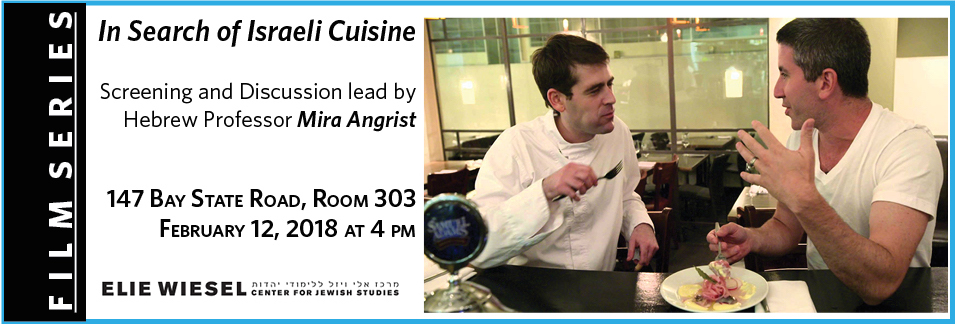
“Anti-Semitism and Zionism: Ideology or Emotions?” with Professor Derek Penslar
January 29, 2018
BUJS Forum

Judaism Was a Civilization: Towards A Reconstruction of Ancient Jewish Peoplehood
December 4, 2017
Part of the BUJS Research Forum Series

Modern Mediterranean Identities: Catholic Pasts and Futures in France
November 17, 2017

“The Land Beyond the Mountains” Screening with Filmmaker and Journalist Nir Baram
October 30, 2017

The 4th Annual Leo Trepp Lecture
Reimagining Rabbis: Perspectives on an Ancient Profession in 21st century America
October 26, 2017

Love and Borders: A Lecture by Israeli Writer Dorit Rabinyan
October 19, 2017




















